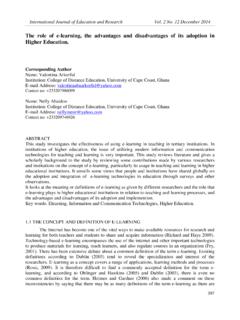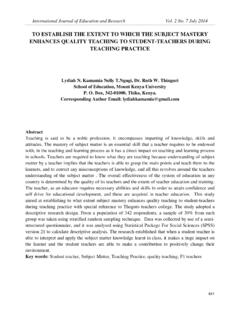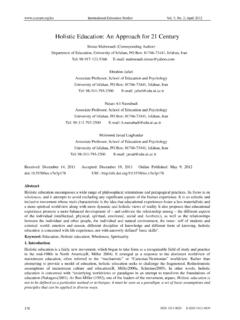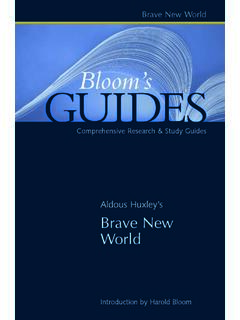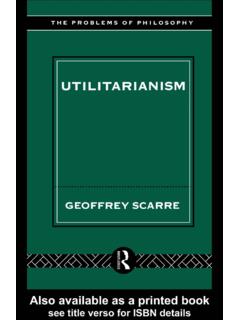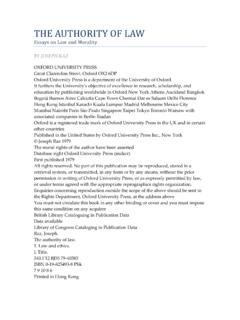Transcription of Theoretical Frameworks and Indigenous Knowledge Systems
1 International Journal of Education and Research Vol. 3 No. 2 February 2015 677 Theoretical Frameworks and Indigenous Knowledge Systems Subject Area: philosophy of Education Joe M. Mwinzi, PhD Department of Educational Foundations South Eastern Kenya University 170 - 90200 Kitui Kenya Email: Cell phone: 0722668516 Abstract The crux of this paper is that the role of philosophy in education is not just a matter of shaping the solidity of pertinent ideas, technical skills, cherished values, or expected attitudes that adhere to an exact paradigm or that conforms to a set of ratified methodological rules. Instead, an influential philosophy in education has to enhance and adapt a continuum which is apposite in its nature, structure, and essence. An apt philosophy enhances concrete education by means of substantiating such education and shaping it within a specified theory.
2 The implication is that such a theory is necessary to define education in terms of its nature, structure, and essence. A philosophical attempt to shape education using a Theoretical framework is comparatively the rationale of this paper. As such, theory plays an important role in determining the nature of educational discourse, including teacher education in a relative perspective. It is therefore necessary to determine the place of theory in the process of education practice, and also ascertain the implication that theory as reflected in Indigenous Knowledge Systems (Mwinzi, 2012:79). A crucial factor in the Indigenous Knowledge Systems rests on the reality of existentialism, communalism, holisticism, preparationism, perennialism, and functionalism in African rationality. Keywords: philosophy , education theory, education practice, Frameworks , Indigenous , Knowledge Systems , logical empiricism, critical rationalism, critical theory, existentialism, communalism, holisticism, preparationism, perennialism, and functionalism.
3 1. Theoretical Frameworks An imperative purpose of philosophy in education is to generate theories and adapt them to estimate and augment education practice. As such, philosophy provides a platform of Theoretical thinking to make education more germane and accurately practical. A wide reflection about reality, thoughts, and ideas denotes a theory. A theory may occur when someone sees dark clouds outside and concludes, or theorizes that it is going to rain because of the clouds are dark. This inclusive ISSN: 2201-6333 (Print) ISSN: 2201-6740 (Online) 678 inference on pedagogical opinions and notions may portray facets such as cultural theory of education which considers how education occurs within the totality of a specified culture, including all the realms of a given society.
4 An inherent outcome of theory within a cultural context is pragmatic in character and abstract in nature. The pragmatic and abstract nature of theory defines communalism, holisticism, preparationism, perennialism, and functionalism as the base of African thought which is perceived in this paper as Indigenous Knowledge Systems . The primary purpose of theorizing is to achieve a better understanding of a human enterprise in terms of its empirical and definite aspects. In education practice, a theory gyrates around topics such as, penology, andragogy, curriculum, learning, policy, organization, pedagogical leadership etc. Similarly, educational theory is influenced by a myriad of disciplines such as history, sociology, philosophy , psychology etc. In principle, a theory in education seeks to know, understand, and prescribe apt practices of pedagogy.
5 Kombo and Tromp (2006:56) hold that a theory is a reasoned statement or groups of statements supported by evidence to explain an event or a phenomenon. The term theory refers to the general and abstract principles of facts (Mwinzi, 2012:126). A theory may consist of hypothesis that has been verified by observation or experiment, or a systematic thinking defined by coherence in thoughts (Randolph, 2009:3). An interaction with theories or ideological constructs enables philosophers to evaluate the impact of human enterprises such as education practice. This is why the concept of theory in the teaching and learning is incessantly influential and also indispensable in restructuring of educational activities to match existing philosophical tenets. The rationale which delineates the essence of this paper is an attempt to respond to the question: what is the role of theory in pedagogical events in relation to the fundamental tenets of thought?
6 As such, meaningful education practice is defined by the capacity to utilize more abstraction in thinking and reasoning to meet the prevailing needs within a specified geographical region, and later projected to synchronize the global precincts. A theory must shape education practice, and be orientated towards Indigenous Knowledge Systems . The current situation in Africa is that theory has been given a nominal role in defining practice in education (Shouler, 2008:243). Based on this discrepancy, it is the role of this paper to explore the dynamics of how Theoretical Frameworks can be aptly interrelated with Indigenous Knowledge in an attempt to refocus attention towards better participation in academic activities. The value of relating Theoretical Frameworks and Indigenous Knowledge is the essence of African perspective of thought which includes ethnophilosophical view, existential slant, political insight, and formal philosophy .
7 These abstract perspectives of African philosophy are solidified by the notions of communalism, holisticism, preparationism, perennialism, and functionalism (Mwinzi & Higgs, 2013:128). It follows necessarily that an ideal education in Africa must be communal, holistic, perennial, functional, and prepare leaners to uphold the essence of societal aspirations. 2. Methodology A methodological approach in this paper comprised of qualitative paradigm, whilst, the fundamental tool of collecting information was primarily interviews among students and faculty members at South Eastern Kenya University. In addition, empiricism and rationalism theories as reflected in African philosophical slants are utilized to reveal the significance of Theoretical and International Journal of Education and Research Vol.
8 3 No. 2 February 2015 679 practical Frameworks in Indigenous Knowledge Systems . Drawing from this paper, education practice must lead the learner to interact with the following Theoretical Frameworks in philosophy : Logical empiricism which claims that the most reliable form of Knowledge emanates from direct experience through the senses (Audi, 2006:515). Critical rationalism involves the questioning and examination the authenticity of ideas and practices. In this regard, intense thinking and open discourse are imperative in solving issues adjacent to human situation (Curren, 2006:307). Critical theory which focuses on an understanding of what power structures are all about, and the impact that such power structures have on individuals, societal agencies, and social institutions (Curren, 2006:495) In its Theoretical framework, African philosophy articulates the significance of African perspective of thought in response to the dominance of Western thought and its claim of cultural superiority (Mwinzi & Higgs, 2013:130) In conclusion, philosophy of education remains as a critical and oppositional discourse for understanding challenging and responding to issues in Knowledge Systems using Theoretical astuteness.
9 Such a critical and oppositional discourse appraises the concepts, beliefs, assumptions, and values in prevailing education theories and practices. A basic feature of theory is that it seeks to emancipate the students and their teachers from their dependency on practices that are the product of precedent ideological constructs by developing modes of enquiry that are implicit in the Theoretical framework through which teachers organize their experiences and practices. It is therefore argued that without the necessary Theoretical astuteness, teachers will not be able to interact critically with cultural, social and economic concerns which direct impact upon their classroom practice. 3. The Concept of Educational Theory A theory is the general principle or a set of abstract facts that operate in contrast to practice.
10 As such, a theory can denote hypotheses that are verified by observation, experiment, or a slant presaging systematic thinking that comprises of coherence of thoughts. An educational theory is the outcome of pedagogical conjecture on matters of teaching and learning. As such, an educational theory is the product of studying educational practice. Educational theory enhances educational practice in as far as educational theory suggests ways and means to overcome the problems of educational practice. There are three distinct types of educational theories derived from three different perspectives. The first one is the point of view held by educational practitioners, second is the perspective adopted by educational scientists, and the third is the perspective taken by the educational philosophers. These perspectives are important basis of understanding of education practice.
